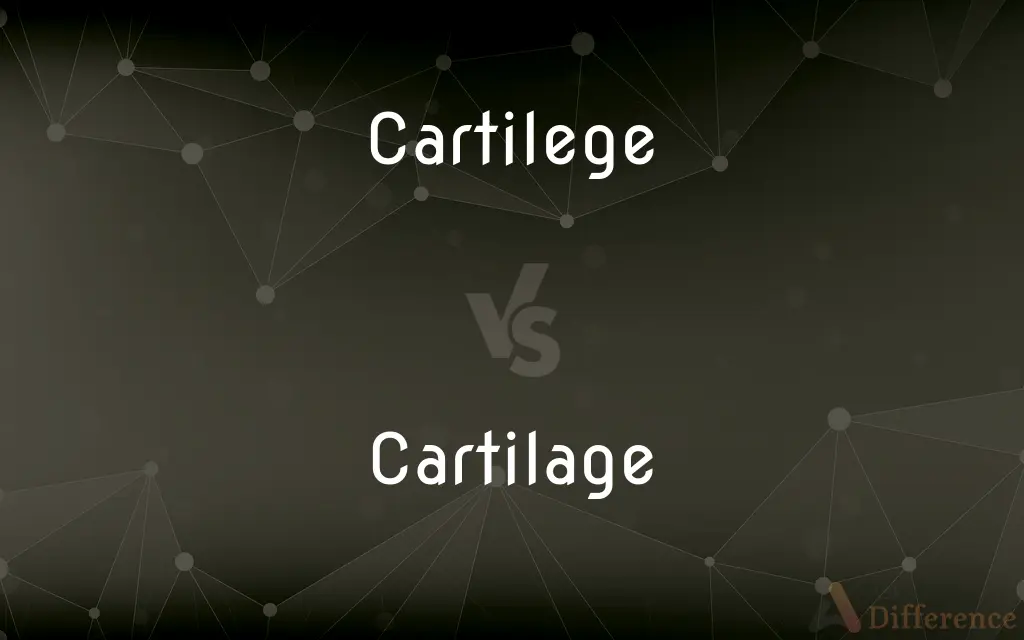Cartilege vs. Cartilage — Which is Correct Spelling?
Edited by Tayyaba Rehman — By Fiza Rafique — Updated on April 2, 2024
"Cartilege" is the incorrect spelling. The correct spelling is "cartilage," which refers to the firm, flexible tissue in joints.

Table of Contents
Which is correct: Cartilege or Cartilage
How to spell Cartilage?

Cartilege
Incorrect Spelling

Cartilage
Correct Spelling
ADVERTISEMENT
Key Differences
Remember "cartilage" has an 'a' after 't' and not an 'e.'
Recollect that "age" in "cartilage" signifies time, as cartilage can wear over time.
Mnemonic: “Car” needs “til-age” to run smoothly, just as joints need cartilage.
Link "cartilage" to "cartridge" for a similar spelling pattern.
Think of "car" and "tilage" combining to form "cartilage."
ADVERTISEMENT
How Do You Spell Cartilage Correctly?
Incorrect: The cartilege in your ears and nose is softer than bone.
Correct: The cartilage in your ears and nose is softer than bone.
Incorrect: She is studying the growth of cartilege in sharks.
Correct: She is studying the growth of cartilage in sharks.
Incorrect: The injury damaged the cartilege in his knee.
Correct: The injury damaged the cartilage in his knee.
Incorrect: He had surgery to repair torn cartilege in his shoulder.
Correct: He had surgery to repair torn cartilage in his shoulder.
Incorrect: Aging can lead to the wear of cartilege in joints.
Correct: Aging can lead to the wear of cartilage in joints.
Cartilage Definitions
Found in the respiratory tract and intervertebral discs.
The trachea is reinforced by cartilage rings.
Can be hyaline, fibrous, or elastic.
Hyaline cartilage covers the ends of bones.
Cushions and supports bones at joints.
Damage to cartilage can result in joint pain.
A flexible connective tissue in mammals.
The knee contains a significant amount of cartilage.
A tissue more flexible than bone.
Cartilage in the ear gives it its shape.
A tough, elastic, fibrous connective tissue that is a major constituent of the embryonic and young vertebrate skeleton and in most species is converted largely to bone with maturation. It is found in various parts of the human body, such as the joints, outer ear, and larynx.
A usually translucent and somewhat elastic, dense, nonvascular connective tissue found in various forms in the larynx and respiratory tract, in structures such as the external ear, and in the articulating surfaces of joints. It composes most of the skeleton of vertebrate embryos, being replaced by bone during ossification in the higher vertebrates.
A particular structure made of cartilage.
A translucent, elastic tissue; gristle.
Tough elastic tissue; mostly converted to bone in adults
Cartilage Meaning in a Sentence
Ear piercings go through the cartilage, not just the skin.
He is researching new treatments to regenerate damaged cartilage.
Cartilage is essential for the smooth movement of joints.
Sharks have skeletons made entirely of cartilage, not bone.
Scientists are studying how cartilage grows in order to help people with arthritis.
The cartilage in the joint can become inflamed and cause pain.
The doctor explained that the cartilage cushioning her knees was thinning.
The stiffness she felt in the morning was due to cartilage degeneration in her hip.
The meniscus is a piece of cartilage that provides a cushion between your femur and tibia.
He underwent a procedure to remove excess cartilage from his knee joint.
Cartilage does not heal as easily as bone because it lacks a blood supply.
Nose surgery often involves reshaping the cartilage for aesthetic or functional reasons.
Many athletes suffer from cartilage injuries due to the high impact on their joints.
The cartilage piercing took longer to heal than her lobe piercings.
Cartilage serves as a shock absorber, protecting bones from the force of impact.
Cartilage damage is a common issue that can lead to joint pain and stiffness.
Fish have flexible skeletons made of cartilage, which allows for their swift movements in water.
Babies are born with more cartilage in their skeletons, which eventually turns into bone.
Cartilage Idioms & Phrases
Cartilage degeneration
The breakdown or deterioration of cartilage, often due to aging or injury.
Cartilage degeneration can lead to joint pain and reduced mobility.
Flexible cartilage
Cartilage that is able to bend or flex, found in areas like the ears and nose.
The flexible cartilage in the ear makes it possible to fold or bend the ear without damage.
Cartilage growth
The development and formation of cartilage in the body.
Cartilage growth is crucial during the early stages of skeletal development.
Cartilage injury
Damage to the cartilage due to trauma, wear and tear, or disease.
A cartilage injury in the knee can significantly impair a person's ability to walk or run.
Cartilage regeneration
The body's process of repairing or regrowing damaged cartilage.
Scientists are studying ways to stimulate cartilage regeneration in damaged joints.
Shock-absorbing cartilage
Cartilage that helps to cushion impacts, found in the knee and other joints.
The shock-absorbing cartilage in our knees protects them from damage when we run or jump.
Artificial cartilage
Synthetic material used to replace damaged cartilage in the body.
Researchers are working on creating artificial cartilage that mimics the properties of natural cartilage.
Cartilage repair
The process of healing or restoring damaged cartilage.
Advances in cartilage repair techniques have improved outcomes for patients with joint injuries.
Common Curiosities
What is the root word of cartilage?
Derived from the Latin word "cartilago."
What is the verb form of cartilage?
Cartilage is a noun and does not have a verb form.
Which conjunction is used with cartilage?
"And" as in "cartilage and bone."
What is the pronunciation of cartilage?
/ˈkɑːr.tɪ.lɪdʒ/
Which vowel is used before cartilage?
"A" as in "a piece of cartilage."
Which article is used with cartilage?
Both "a" and "the" can be used, depending on context.
Is cartilage an adverb?
No.
What is the plural form of cartilage?
Cartilages.
Is cartilage a negative or positive word?
Neutral; it's a scientific term.
Why is it called cartilage?
The term originates from Latin "cartilago," meaning "hardened tissue or gristle."
Is the cartilage term a metaphor?
Not inherently, but it can be used metaphorically.
Is the word cartilage imperative?
No.
What is the singular form of cartilage?
Cartilage.
Which preposition is used with cartilage?
"Of" as in "cartilage of the knee."
Is cartilage a countable noun?
Yes, one can have multiple cartilages.
Which determiner is used with cartilage?
"This" as in "this cartilage."
How do we divide cartilage into syllables?
car-ti-lage.
What is the second form of cartilage?
Not applicable.
What is a stressed syllable in cartilage?
"car."
What is another term for cartilage?
Gristle.
What is the opposite of cartilage?
Bone (in terms of rigidity).
How is cartilage used in a sentence?
"The surgeon examined the damaged cartilage in the patient's knee."
Is cartilage a noun or adjective?
Cartilage is a noun.
Is cartilage a collective noun?
No.
How many syllables are in cartilage?
Three.
What is the first form of cartilage?
Cartilage doesn't have verb forms; it remains "cartilage."
What is the third form of cartilage?
Not applicable.
Is cartilage an abstract noun?
No, it is concrete and refers to a specific type of tissue.
Is cartilage a vowel or consonant?
"Cartilage" is a word consisting of both vowels and consonants.
What part of speech is cartilage?
Noun.
Share Your Discovery

Previous Comparison
Heirarchy vs. Hierarchy
Next Comparison
Idealogy vs. IdeologyAuthor Spotlight
Written by
Fiza RafiqueFiza Rafique is a skilled content writer at AskDifference.com, where she meticulously refines and enhances written pieces. Drawing from her vast editorial expertise, Fiza ensures clarity, accuracy, and precision in every article. Passionate about language, she continually seeks to elevate the quality of content for readers worldwide.
Edited by
Tayyaba RehmanTayyaba Rehman is a distinguished writer, currently serving as a primary contributor to askdifference.com. As a researcher in semantics and etymology, Tayyaba's passion for the complexity of languages and their distinctions has found a perfect home on the platform. Tayyaba delves into the intricacies of language, distinguishing between commonly confused words and phrases, thereby providing clarity for readers worldwide.


































